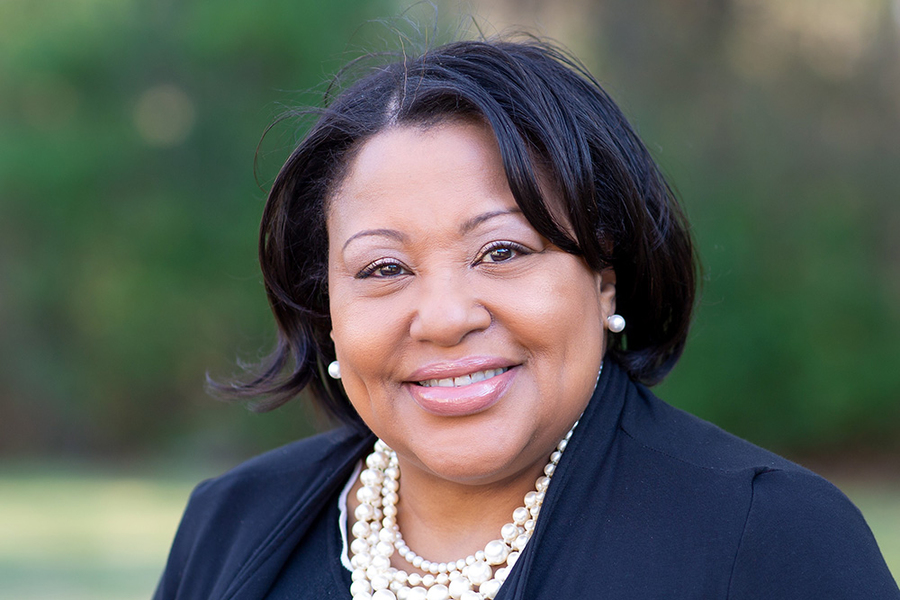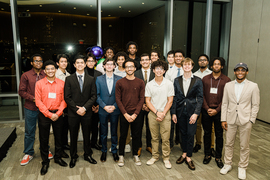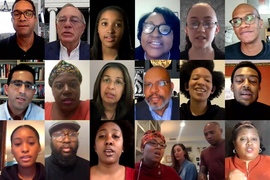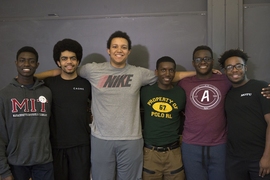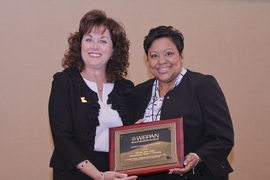Associate Dean and Office of Minority Education (OME) Director DiOnetta Jones Crayton has announced that she will step down from her role on Feb. 2. She has led the office for 14 years, advancing OME’s efforts to provide a robust portfolio of programs, services, and resources for undergraduate students of color.
“It has been my honor to serve as director of the OME for the past 14 years,” Crayton wrote in a letter to the staff of the Office of the Vice Chancellor announcing her departure. “As a team, we have accomplished great things together … It has been so rewarding and such a blessing to contribute to so many lives as well as different committees, programs, events, and services over the years.”
Founded in 1975, OME aims to foster academic excellence, build strong communities, and cultivate students’ professional mindsets to position them to become leaders in all career fields, as well as in civic life.
“DiOnetta has been a long-standing advisor, mentor, and change-maker at the Institute,” says Ian A. Waitz, vice chancellor for undergraduate and graduate education. “She has served on numerous Institute committees and been an essential thought partner in navigating some of the most challenging issues facing our students. I have personally valued her commitment to excellence, her strategic vision and leadership, and her ability to communicate her passion to others.”
Indeed, Crayton has been a change-maker since she arrived at MIT in August 2009, after holding leadership roles at Cornell University, the National Consortium for Graduate Degrees for Minorities in Engineering and Science, the University of California at Berkeley, and the University of the Pacific in Stockton, California. Within her first academic year alone, OME adopted a new mission statement; launched comprehensive, data-driven assessments of several existing programs; and devised a new staffing model to ensure the office would reach “optimal success,” as she said at the time.
She also piloted several new programs that year that have become mainstays in OME, including Master Your Future, a professional development workshop series. And she restructured OME’s industry partnership program, the Industrial Advisory Council for Minority Education (IACME), resulting in a threefold increase in member companies, as well as adding nonprofits, government labs, and alumni affinity groups to the mix.
Beyond making campus-based improvements, DiOnetta also “led outward,” co-chairing a major conference on underrepresented minority student success in higher education, held at MIT in April 2010. The conference brought together national experts, university diversity officers, and academic administrators from Ivy-Plus schools and other leading institutions to discuss the challenges at their institutions. The lessons gleaned from the gathering informed her strategic vision for her office, as well as her involvement in diversity, equity, and inclusion efforts more broadly at MIT.
Cordelia Price ’78, SM ’82, who has worked with Crayton since 2009, says, “I have seen DiOnetta’s excellent leadership, organizational, communication, initiative, effective meeting, and listening skills in action.” Price serves as the Black Alumni of MIT (BAMIT) representative to IACME and as chair of operations for the BAMIT Community Advancement Program, which funds student projects that benefit underserved communities of color.
Under Crayton’s leadership, Price adds, “[OME] programs have helped many students with their academic success, their opportunities for internships, their preparation for future employment or graduate school, and provided opportunities to serve the community. She also established or strengthened mentor programs, including mentors from IACME companies as well as MIT alumni.”
During Crayton’s tenure, OME has embraced a spirit of innovation — a quality well-suited for MIT’s ethos — to best meet students’ needs. For example, long before the pandemic forced the Institute to pivot to remote instruction and programs in 2020, she and her staff were already implementing a plan to adapt one of OME’s signature programs, Interphase EDGE (IP), into an online format. Applications for IP, a two-year scholar enrichment program that includes a seven-week summer session on campus, had been increasing dramatically. In an effort to serve more students, in 2018 Crayton’s team began working with MITx on an online platform to accommodate a new, remote cohort called IPx. By 2020, with that infrastructure in place, OME was able to offer the remote program to both cohorts, despite the closure of campus that summer.
So much of OME’s success comes down to Crayton’s emphasis on listening, says Myles Noel, a senior majoring in chemistry. He’s gotten to know her well as an IP participant and through interacting with her on various committees and student organizations. “Her leadership style is a lot of listening; she’s willing to listen to the issues that students are experiencing and from that, she is able to offer support and advice,” he says.
Listening to students has also informed the development of new programs. Two recent examples are The Standard, for men of color, and the CRWN (pronounced “crown”), for women of color. Both programs address a need that undergraduate students articulated — a desire to create a close-knit affinity group — while also supporting their academic and professional success.
“DiOnetta’s extraordinary leadership and unwavering emotional investment has helped countless students identify, open, and walk through doors of opportunity,” says Chancellor Melissa Nobles. “Her deep belief in our students has inspired them to believe in themselves and work towards their dreams — especially when they were unsure of themselves. She has made OME, MIT, and our world a better place over these past 14 years.”
Indeed, students speak fondly of Crayton’s ability to inspire them to believe in themselves. Noel says she has been an invaluable mentor and advisor. “She has been a pillar of support for me and a lot of other students in the community.” Kerrie Greene, an MD/PhD student who has known Crayton for almost 10 years, adds, “Dean Crayton is such a light, her warmth surrounds everything and everyone she supports. Under her guidance and leadership, I have seen countless numbers of my peers, including myself, blossom during their time at MIT and beyond.”
“Students will feel her loss, but the impact that she’s had is going to be lasting, and I think that’s something to be happy for,” says Noel.
